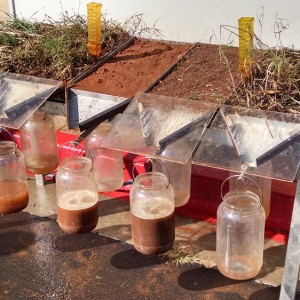The Stream, October 14: Pennsylvania Fracking Contamination Came From Surface Spills, Study Finds
The Global Rundown |
Well water contamination near some hydraulic fracturing sites in Pennsylvania came from surface spills, not from chemicals injected into the ground, a new study found. A growing percentage of Americans believe in climate science, according to a recent survey. China completed a major hydropower project in Tibet, and water experts warned that Bangladesh is at risk from increasingly salty rivers. Allowing wildlife greater access to rivers in regions of Africa could actually safeguard water quality, researchers said. A lawsuit in California claims the U.S. Forest Service is allowing Nestle to use water without a valid permit.
“Left unattended, 2.9 million to 5.2 million poor (people) in southwest coastal Bangladesh will face serious river salinity problems by 2050.”–Susmita Dasgupta, an environmental economist at the World Bank, on rising salt levels in coastal Bangladesh’s rivers caused by rising sea levels and changing rainfall patterns. (Reuters)
By The Numbers |
70 percent Americans who believe in climate science, an increase of 7 percent over the past six months, according to a survey by the University of Michigan and Muhlenberg College. Guardian
510 megawatts Capacity of the new Zangmu hydropower plant in Tibet, completed this week by a Chinese company. Reuters
Science, Studies, And Reports |
Contaminants found in water wells near hydraulic fracturing sites in Pennsylvania were linked to surface spills of fracking fluid rather than chemicals injected underground, according to a study published in the Proceedings of the National Academy of Sciences. The study suggests that the contamination could be easier to prevent and treat than previously thought, though the authors cautioned that the results may not apply in other regions of the United States. Inside Climate News
Limiting wildlife access to rivers in dryland areas of Africa can serve to concentrate populations and their effect on water quality, according to a study by researchers at Virginia Tech. The study’s authors recommended that wildlife water access be considered a priority during the design of protected areas. Phys.org
On The Radar |
Environmental and human rights groups filed a lawsuit Tuesday against the U.S. Forest Service in an effort to stop Nestle from piping water out of California’s San Bernardino National Forest. The groups say the Forest Service is allowing the company to take the water without a valid permit. The Desert Sun
A news correspondent for Circle of Blue based out of Hawaii. She writes The Stream, Circle of Blue’s daily digest of international water news trends. Her interests include food security, ecology and the Great Lakes.
Contact Codi Kozacek







Leave a Reply
Want to join the discussion?Feel free to contribute!